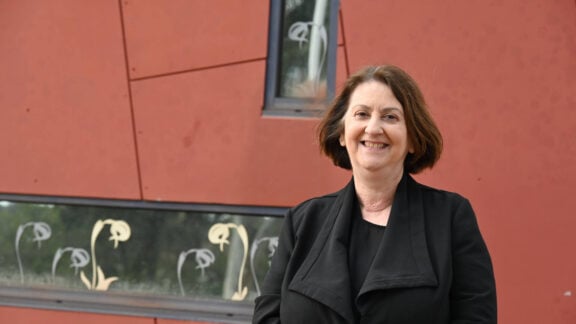The much-anticipated musical Taxithi by Greek Australian Helen Yotis Patterson is set to hit the stage next month, but it’s not just audiences looking forward to opening night.
For seasoned performer Maria Mercedes, the production, which tells the untold stories of courageous Greek female migrants of the 1950s and ’60s, is also a chance, she says, to fully embrace her Greek heritage.
After years of singing in English, she will take to the stage in what will be her début singing in the Greek language, and she makes no secret of the fact that it will be a significant moment not only for herself, but her family.
“It is truly a coming of age and an acknowledgement of the Greek blood that runs through my veins, and the Greek spirit that I have denied for so long,” Mercedes tells Neos Kosmos.
Though she admits to initially being daunted by the idea, she says her feelings of unease were soon appeased, claiming that she felt as though it were in her DNA.
“My parents George and Dionisia Moutsidis brought us up on Greek music and dancing, so subconsciously it’s always been there. I adore the melodies, the metaphors, the melancholy, the life that is in Greek songs; nothing compares,” she says.
The musical, adapted from surveys involving 20 Greek Australian female migrants, is a tribute to their stories of hardship and heartache, stories that Mercedes says she feels a huge sense of responsibility to do justice.
“It is incredibly important to be a part of Taxithi; my mother’s and my aunt’s journeys echo throughout the piece.
“Just imagine in this day and age having to travel for months on a ship to a continent that was foreign on every level: language, customs, culture, food, spirit and topography, many being made to marry strangers, face hardships and uncertainties thousands of miles away, knowing you will be totally isolated.”
Though the experiences date back some 70 years, the impacts of the migrant experience continue to resonate in the life of second, third and fourth generation Greek Australians.
“These women paved the way for generations that followed, not only on domestic levels but in astute business levels. They came with nothing to a country that was supposedly paved with ‘gold’ and turned that fallacy into positive and good things for themselves and their families,” adds Mercedes.
Which is why the performer believes it is so important for younger generations to engage with stories such as those depicted in the impending musical, so as to understand the sacrifices made by those before them, and to fully appreciate the opportunities afforded them.
Armed with such wisdom, one can’t help but question why it then took Mercedes so long to come to terms with her own identity and explore the ethnic side to her artistic expression.
The response is one that comes with deeply embedded regret.
“I guess all the adversity and longing to fit into an Anglo culture blinded me to the artistic beauty of my motherland,” she explains.
“My biggest regret is that my father George never lived long enough to hear me sing in Greek, but my mother definitely will and so will the rest of my relatives.”
Taxithi will also see the performer take the opportunity to announce her birth name of ‘Maria Moutsidis’, a big moment for her since she has opted for the ambiguous stage name of ‘Maria Mercedes’ for decades.
Taxithi will be performed from 2-20 March at fortyfivedownstairs gallery, 45 Flinders Lane, Melbourne, Victoria. For more information and to book tickets, call (03) 9662 9966 or visit www.fortyfivedownstairs.com/








